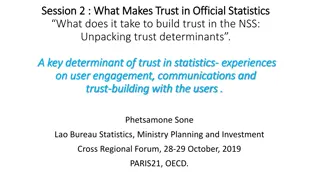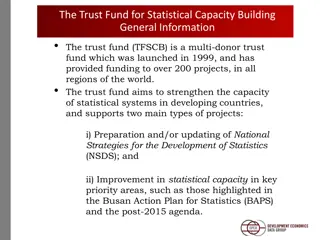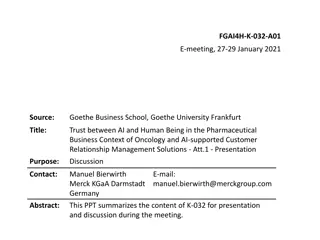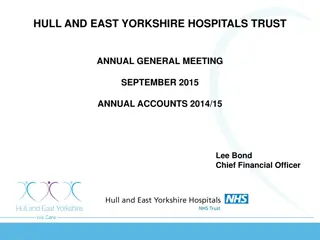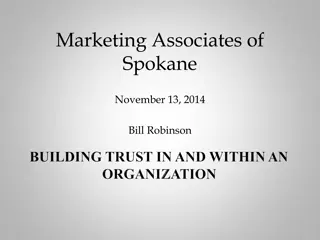
Building Trust and Collaboration in Healthcare Education
Explore the importance of trust within interprofessional teams in healthcare education, emphasizing self-awareness, communication, and fostering psychological safety. Discover key elements that facilitate trust, such as mutual respect, clear roles, and shared goals. Learn how behaviors like seeking feedback, giving help, and engaging in constructive conflict can enhance trust and teamwork in the healthcare setting.
Uploaded on | 1 Views
Download Presentation

Please find below an Image/Link to download the presentation.
The content on the website is provided AS IS for your information and personal use only. It may not be sold, licensed, or shared on other websites without obtaining consent from the author. If you encounter any issues during the download, it is possible that the publisher has removed the file from their server.
You are allowed to download the files provided on this website for personal or commercial use, subject to the condition that they are used lawfully. All files are the property of their respective owners.
The content on the website is provided AS IS for your information and personal use only. It may not be sold, licensed, or shared on other websites without obtaining consent from the author.
E N D
Presentation Transcript
BCH Academy for Teaching and Educational Innovations and Scholarship Building Trust Across Learner Professions Ellen Goodman, MSW Jennifer Kesselheim MD, MEd
Getting to Know You Find someone you don t already know Introduce yourself and: describe how you chose your health profession name one thing that is important to know about you, in your role as a healthcare professional 2
Trust in Interprofessional Teams Universally relied on but rarely discussed Implicit in the function of healthcare teams Inhibits errors, biases, stereotypes Begins with self awareness & communication 3
Elements of Trust Domains of trust: Profession Knowledge and skills Work ethic Character Trust based on: Competence and performance Title, degree, status, positional authority 4
What Facilitates Trust in Teams? Understand, respect and value profession and individual Clear roles and responsibilities Encourage participation of others Honesty, openness and curiosity Leader and a listener Shared goals and values 5
Psychological Safety Beliefs Respect for each other s abilities Interested in each other as people Not rejected for stating what you think Able to make mistakes Members have positive intentions (Edmundson, 1999) 6
Psychological Safety Behaviors Seeking and giving feedback Asking for and giving help Making improvements or changes Trying new things Engaging in productive disagreements 7
Fostering Psychological Safety Model and lead by example Encourage active listening Develop an open mindset Share failures and mistakes Solicit input Give direct, honest feedback Engage in constructive conflict Forgive others mistakes (and your own) 8










